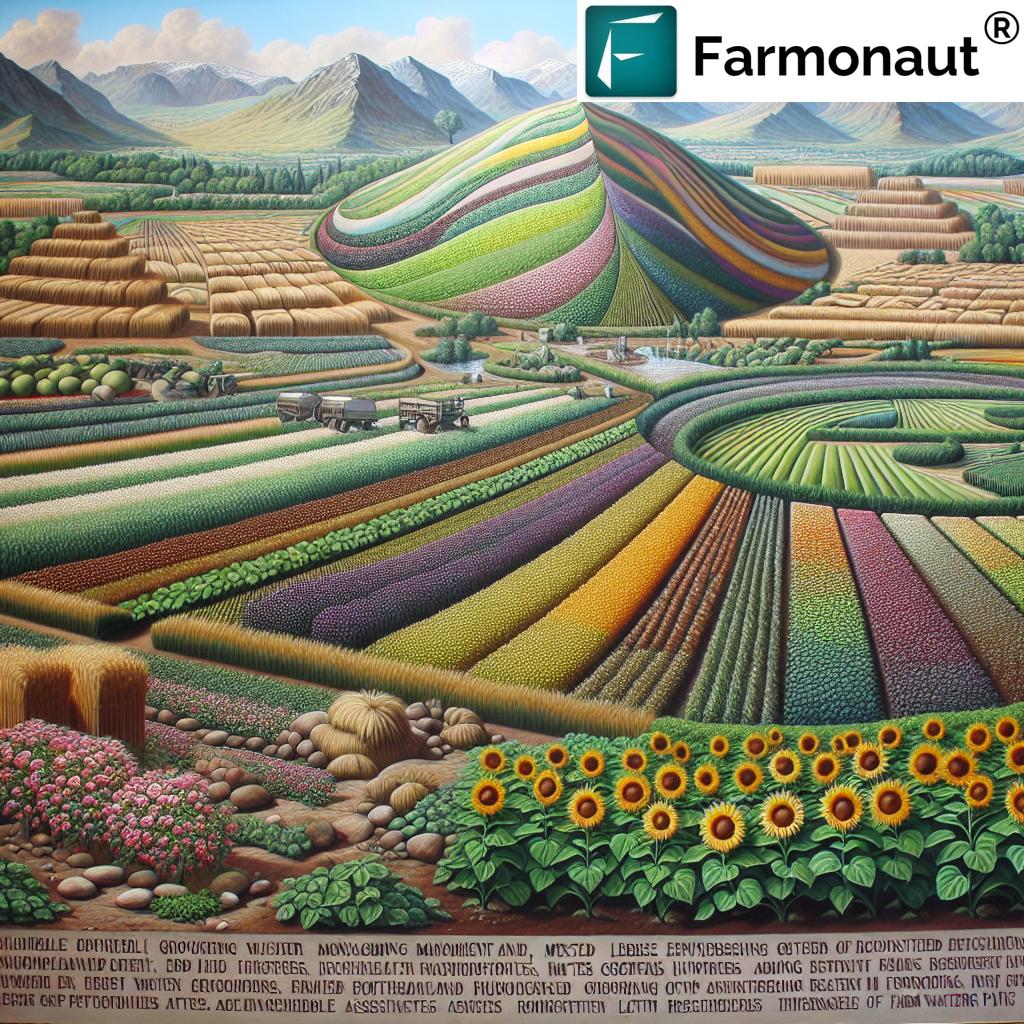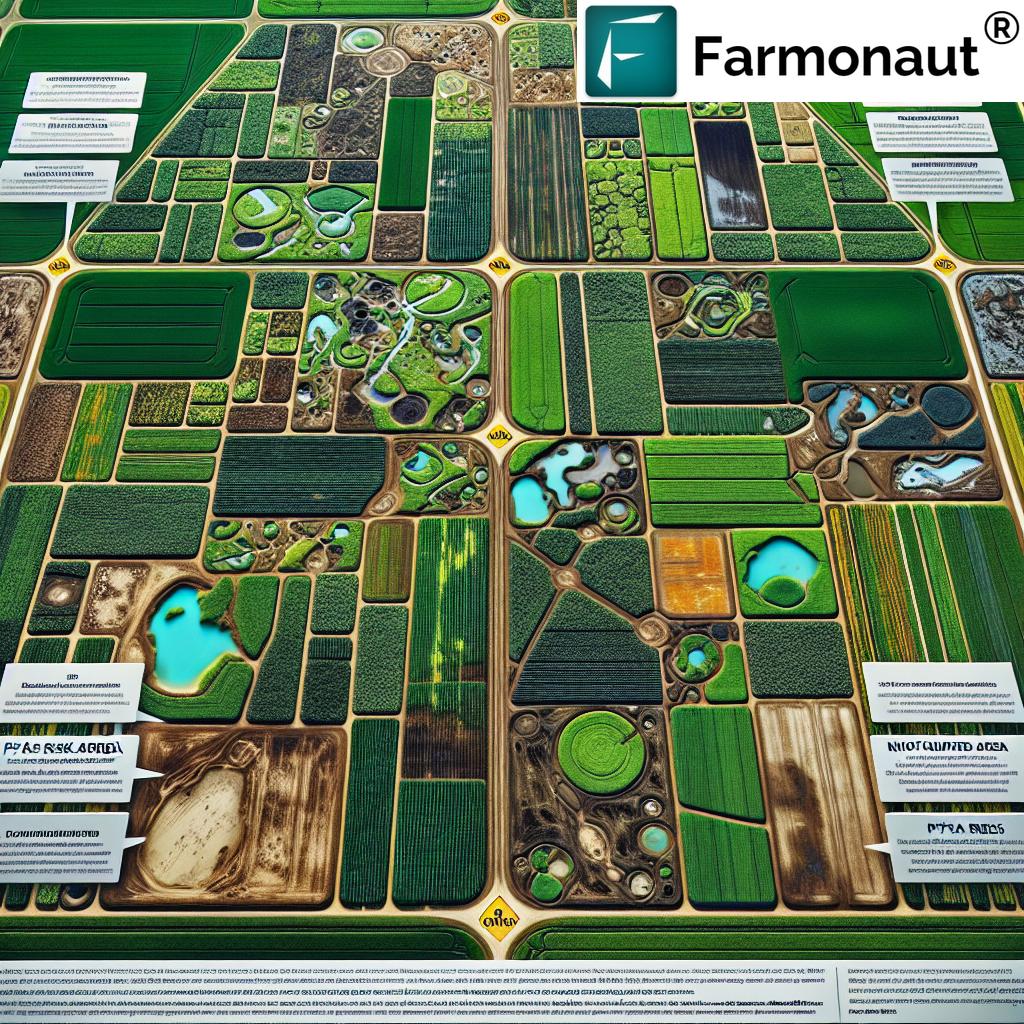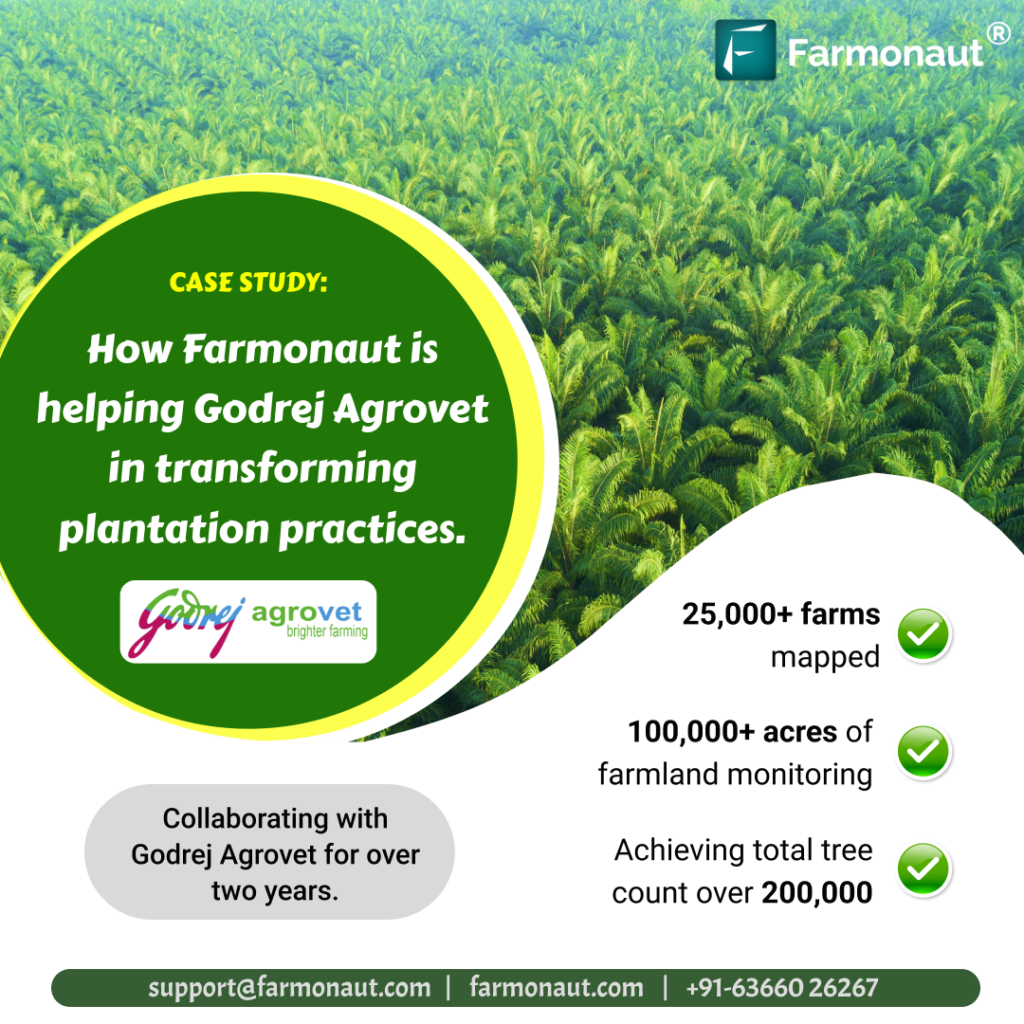Climate Friendly Farming: 7 Practices for Resilience
Meta Description:
Climate-friendly farming practices improve soil health, water management, and crop resilience—key to combating the impacts of climate change on agriculture and advancing sustainability.
Table of Contents
- Introduction: Climate Change & Sustainable Agriculture
- Impacts of Climate Change on Agriculture
- Benefits of Climate-Friendly Farming Practices
- The 7 Essential Climate-Friendly Farming Practices
- Comparison Table of Climate-Friendly Practices
- Sustainable Agriculture Challenges & Considerations
- Farmonaut: Technology for Climate-Resilient Farming
- Frequently Asked Questions
- Conclusion
Introduction: Climate Change & Sustainable Agriculture
As we navigate the 21st century, climate change has become the defining challenge for global agriculture. Its impacts—from soil health degradation and unpredictable rainfall patterns to water scarcity and rising pest infestations—make resilient, climate-friendly farming practices indispensable. At Farmonaut, our mission aligns with empowering farmers, agribusinesses, and policymakers to implement methods that mitigate adverse events and promote sustainability.
This comprehensive guide examines how climate-friendly farming practices can shape the future of food by improving soil fertility, conserving water resources, supporting biodiversity, and enhancing crop resilience—all while reducing agriculture’s carbon footprint. We will explore seven proven practices, offer actionable insights, and showcase how precision technologies like Farmonaut are revolutionizing farm management worldwide.
Impacts of Climate Change on Agriculture
Climate change disrupts agricultural systems globally. In 2024, France experienced significant winter crop loss (a 30-40% reduction), with parallel disruptions in Brazil, Niger, and the United States. (Source: Le Monde)
- Droughts, floods, and irregular rainfall compromise crop yields and deplete water availability.
- Soil erosion and declining fertility endanger the productivity of agricultural lands.
- Shifting precipitation patterns and warmer temperatures expand the range of pests and diseases, threatening harvests and incomes (Source).
These challenges demand solutions that bolster the resilience of food systems while reducing environmental impacts.
Benefits of Climate-Friendly Farming Practices
Implementing climate-friendly farming practices offers transformative benefits, including:
- Enhanced agricultural resilience: Sustainable methods reduce vulnerability to climate events and market shocks.
- Improved soil health and conservation: Healthy soil is richer in carbon, nutrients, and water-holding capacity.
- Higher crop productivity: Practices like crop diversification and precision farming help stabilize and increase yields.
- Biodiversity conservation: Agroecological approaches foster habitat diversity and benefit beneficial organisms.
- Reduced greenhouse gas emissions: Conservation tillage, organic amendments, and agroforestry promote carbon sequestration.
The 7 Essential Climate-Friendly Farming Practices
Let’s explore the seven practices with the greatest impact on climate resilience, sustainability, and agricultural productivity.
1. Agroecology and Crop Diversification
Agroecology combines traditional farming knowledge with modern technology—such as precision agriculture—to cultivate productivity while restoring ecosystem health. Crop diversification methods are at the core of agroecology:
- Crop rotation: Alternating crops across seasons manages soil fertility, disrupts pest cycles, and prevents disease buildup (Source).
- Intercropping: Combining two or more crops in the same field increases biodiversity and reduces the risk of total crop loss from unpredictable weather patterns or pests.
- Polycultures and companion planting: Leveraging the interactions between plant species to improve yields and suppress pests naturally.
By integrating crop diversity, farmers increase their farms’ resilience to climate events and promote a more sustainable ecosystem.
Discover how large-scale farm management can leverage precision agriculture for implementing crop rotation, intercropping, and comprehensive data-driven management, all powered by Farmonaut’s satellite-based solutions.
2. Soil Health and Conservation
Healthy soil is the cornerstone of resilient agriculture. Through soil health and conservation practices, we can improve fertility, increase carbon sequestration, and secure farm productivity:
- No-till or reduced tillage: Minimizing soil disturbance decreases erosion, protects carbon stores, and encourages beneficial soil organisms (Source).
- Cover cropping: Growing plants such as legumes or grasses during off-seasons reduces soil erosion by up to 90% and supports soil organic matter.
- Compost and organic amendments: Adding organic matter, like compost, boosts microbiological activity and nutrient cycling.
- Mulching: Retains moisture and shields soil from the impacts of rainfall events and temperature extremes.
Protecting and enhancing carbon sinks in soils—particularly gardens and agricultural lands—plays a crucial role in mitigating climate change.
Explore Farmonaut’s carbon footprinting services to monitor and manage your field’s carbon sequestration, supporting your sustainability goals.
3. Sustainable Water Management in Farming
Climate change disrupts precipitation patterns—making efficient water use and conservation critical. Sustainable water management in farming protects crops from droughts and floods and promotes ecosystem health:
- Rainwater harvesting: Capturing and storing rainwater for later use buffers irrigation needs during dry spells.
- Drip and sprinkler irrigation systems: Distribute water resources precisely where and when needed, reducing overall water consumption.
- Protecting wetlands: Wetlands sequester carbon, filter water, and create habitats for essential organisms (Source).
Tracking soil moisture and precipitation patterns is vital for managing water and preventing crop stress. Farmonaut’s satellite-based crop health monitoring provides real-time soil moisture data—supporting water management and irrigation scheduling.
See how our large-scale farm management solutions can help monitor irrigation and water efficiency for both smallholders and agribusinesses.
4. Agroforestry Benefits
By integrating trees with agriculture, agroforestry offers robust environmental and economic benefits. The agroforestry benefits include:
- Enhanced biodiversity conservation through multi-layered habitats
- Soil erosion control and improved soil health with tree roots stabilizing lands
- Water retention by increasing shade and organic litter
- Additional income from timber, fruits, and non-timber forest products
- Carbon sequestration—trees store large quantities of carbon, mitigating climate impacts
Farmonaut’s crop plantation and forestry advisory tools support the management of agroforestry systems at scale for maximum resilience and profitability.
5. Climate-Resilient Crop Selection
Adapting to changing climate patterns requires selecting crops and varieties bred or adapted for drought resistance, flood tolerance, or pest resistance. Climate-resilient crop selection can help maintain yields and safeguard food security:
- Drought-tolerant varieties for arid and semi-arid regions
- Early-maturing crops that escape late-season drought or disease pressure
- Pest- and disease-resistant cultivars
Farmonaut’s Jeevn AI advisory system delivers real-time analytics on crop health, pest risks, and weather forecasts to guide farmers’ crop choices and management throughout each stage.
6. Reduced Chemical Inputs & Organic Farming Techniques
High reliance on chemical fertilizers and pesticides increases greenhouse gas emissions and degrades soil, air, and water quality. Instead, organic farming techniques and integrated pest management (IPM) offer sustainable alternatives:
- Reduced chemical input: Limit or replace synthetic fertilizers/pesticides to minimize runoff and atmospheric emissions
- Use of organic amendments: Compost, manure, and biofertilizers support long-term soil fertility and health
- Biological pest control: Encourage beneficial organisms to help manage pest populations naturally (Source)
By implementing integrated pest management and adopting organic farming methods, we improve the entire ecosystem—from soil microbes to pollinators—and mitigate agriculture’s climate impact.
Learn how product traceability powered by blockchain technology helps authenticate organic produce and strengthens supply chain transparency for both consumers and businesses.
7. Advanced Precision Agriculture with Farmonaut
The rise of precision agriculture marries modern technology with traditional farming practices to drive efficiency, reduce losses, and support sustainable agriculture. Farmonaut offers:
- Satellite-based crop health monitoring: Instantly spot stress or pest infestations for timely intervention
- AI-driven farm advisory: Real-time advice on nutrition, water, and resource management
- Field and fleet management: Optimize logistics, reduce costs, and minimize environmental impact
- Blockchain-based traceability: Ensure transparency and integrity in every stage of crop production
Explore Farmonaut’s fleet and resource management tools to streamline agricultural operations and reduce your carbon footprint.
Comparison Table of Climate-Friendly Farming Practices
| Practice Name | Description | Est. Soil Health Improvement (%) | Est. Water Savings (%) | Contribution to Crop Resilience | Climate Impact |
|---|---|---|---|---|---|
| Crop Rotation | Alternating different crops in the same field over time | 30–40% | 10–20% | Breaks pest cycles, stabilizes yields | Reduces N2O emissions; improves soil carbon |
| Conservation Tillage | Limiting soil disturbance (no/reduced till) | 35–50% | 15–25% | Reduces erosion, retains soil moisture | 30% lower GHG emissions/ha |
| Cover Cropping | Growing cover crops in off-season | 45–60% | 5–15% | Prevents erosion, boosts soil health | Sequesters carbon, reduces runoff |
| Integrated Pest Management | Combining biological, cultural, and chemical controls | 20–30% | 5–10% | Reduces losses from pests, minimizes chemical use | Lower pesticide emissions |
| Agroforestry | Integrating trees with crops/animals | 30–40% | 20–40% | Buffers climate impacts, enhances biodiversity | High carbon sequestration rates/ha |
| Efficient Irrigation | Using drip/smart irrigation systems | 15–25% | 30–60% | Reduces drought stress; ensures crop growth | Reduces methane and N2O emissions |
| Organic Amendments | Adding compost/manure/organic fertilizers | 40–55% | 10–20% | Enhances soil structure & nutrient cycling | Increases soil carbon stocks |
Sustainable Agriculture Challenges & Considerations
While the adoption of climate-friendly farming practices is essential, we must recognize the real challenges faced by farmers worldwide:
- Knowledge and training gaps: Farmers need education and ongoing advisory support to transition to new systems and technologies.
- Economic barriers: Upfront investments in irrigation systems, high-quality seed, or technology can be prohibitive, especially for smallholders in countries like Niger or rural Brazil.
- Policy and subsidy support: Government action and institutional support are necessary to scale sustainable transitions.
- Local adaptation needs: Practices must be customized to the local ecosystem, weather, and cultural context.
Farmonaut is committed to breaking these barriers by providing affordable, accessible, and data-driven solutions for all farmers—from France and the United States to Niger and Brazil—supporting the adoption of climate-resilient methods across the globe.
Farmonaut: Technology for Climate-Resilient Farming
Farmonaut is pioneering a future where advanced agricultural technology empowers every farmer to achieve greater resilience, enhanced productivity, and environmental sustainability.
How Farmonaut Supports Climate-Friendly Farming:
- Satellite crop health monitoring: Leveraging multispectral satellite data, we provide actionable insights on crop health, soil moisture, and detect stress or pest infestations early—enabling timely interventions and efficient resource management.
- AI-powered farm advisory (Jeevn AI): Real-time, customized guidance on crop management, variable rate irrigation, fertilizer inputs, and pest management.
- Blockchain-based traceability: Track your crops from seed to market, ensuring supply chain transparency and building consumer trust for sustainable and organic produce.
- Fleet and resource management tools: Optimize the use of vehicles and equipment for logistical efficiency and emission reduction.
- Carbon footprint tracking: Empowering agribusinesses to measure, reduce, and report GHG emissions with field-level precision.
Get started with Farmonaut— choose your platform:
Developers: Access our satellite and weather data via Farmonaut API and detailed API developer docs to build your own precision farming tools or integrate our insights with your research projects!
Ready to scale up? Discover crop loan and insurance verification services powered by real satellite data—improving access to financing, and reducing fraud in agricultural lending and insurance.
Frequently Asked Questions (FAQ)
What are climate-friendly farming practices?
Climate-friendly farming practices are methods and systems that reduce agriculture’s impact on the environment, improve soil health, conserve water resources, promote biodiversity, and make farms more resilient to adverse events such as droughts and floods. Examples include crop rotation, reduced tillage, cover cropping, efficient irrigation, agroforestry, and organic amendments.
How does Farmonaut help farmers adopt climate-resilient practices?
Farmonaut empowers farmers by providing satellite-based crop health monitoring, real-time AI advisories (Jeevn AI), blockchain-based traceability, carbon footprint tracking, and resource management tools. These services help inform farmers about soil moisture, crop stress, pest infestations, and optimal management actions for sustainable and resilient farming.
What are the main challenges to adopting climate-friendly farming practices?
Main challenges include limited knowledge and training among farmers, initial costs of transitioning to sustainable methods, absence of strong policy or subsidy support, and the need to adapt practices to local conditions. Access to user-friendly, affordable technology and constant advisory support can help farmers overcome these barriers.
How does crop rotation help with climate change resilience?
Crop rotation improves soil fertility, breaks pest and disease cycles, and increases yields, making farms more resilient to extreme weather and biological threats. It also helps in maintaining long-term soil structure and organic carbon levels, which are vital for climate change mitigation.
What is carbon sequestration in agriculture?
Carbon sequestration in agriculture refers to the capture and storage of atmospheric carbon dioxide within plant biomass and soils. Practices such as conservation tillage, cover cropping, agroforestry, and use of organic amendments enhance soil organic carbon, helping to reduce net greenhouse gas emissions.
How can I access Farmonaut’s tools for my farm?
Farmonaut’s platform is accessible via Android, iOS, and web apps. You can get started here with satellite-based crop monitoring, farm analytics, and advisory services tailored to your location and farm size.
Conclusion
Climate change poses a profound challenge to global agriculture, but by embracing climate-friendly farming practices, we can transform these threats into opportunities for resilient, productive, and sustainable food systems. By safeguarding soil health, conserving water resources, diversifying crops, and reducing reliance on chemical inputs, farmers from France to Southeast Brazil, Niger, the United States, and beyond can adapt to new climate realities while mitigating future risks.
With the backing of technology partners like Farmonaut, farmers and agribusinesses gain access to actionable insights, real-time monitoring, and resource management solutions. The onus is on all stakeholders—farmers, researchers, policymakers, and consumers—to promote sustainability at every step.
Let’s commit to implementing these seven climate-friendly farming practices—not only to cushion against the impacts of climate change on agriculture, but to foster thriving rural economies and restore the planet’s natural systems for generations to come.


















